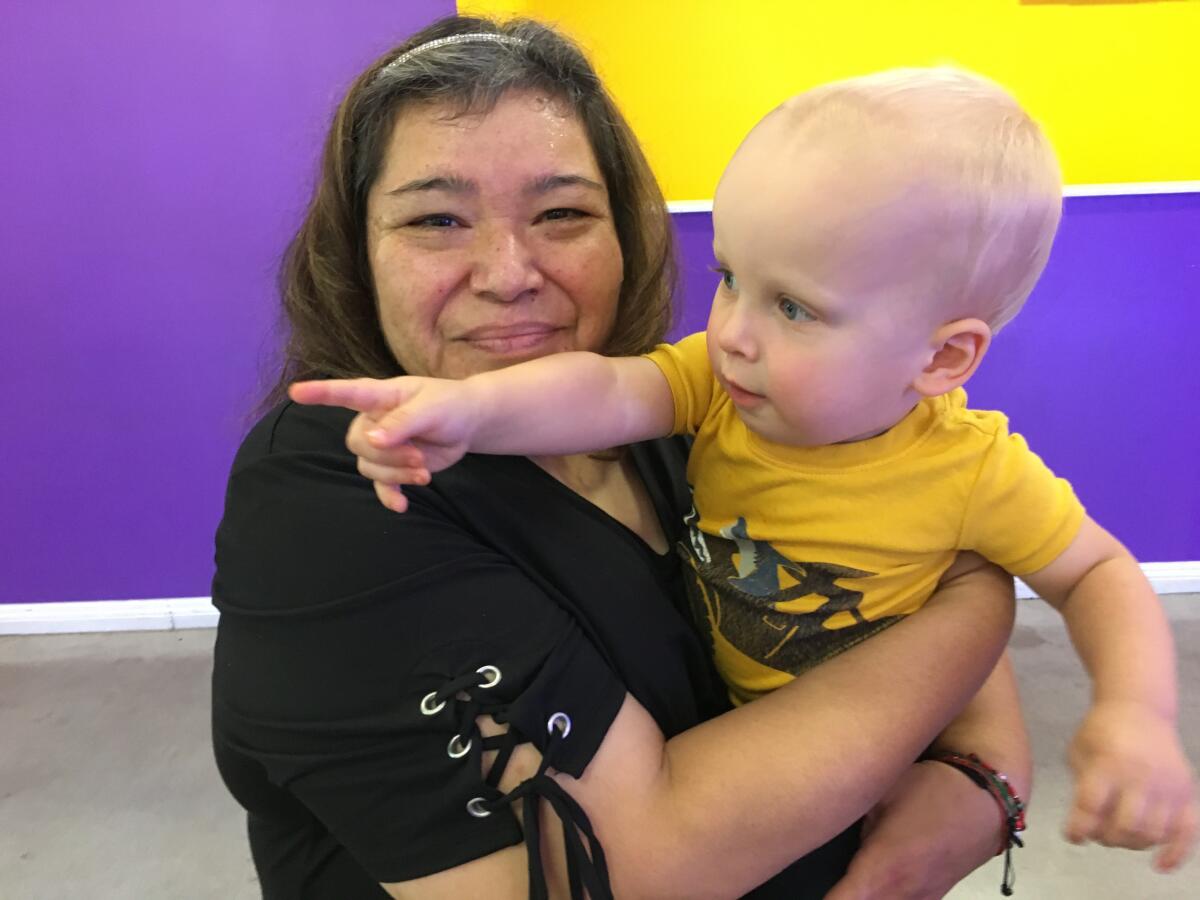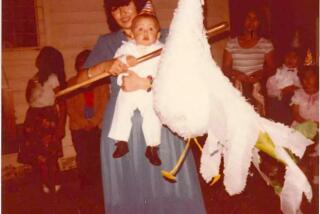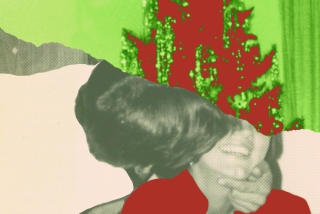‘My mom died last night.’ A teacher lost to COVID-19, leaving a young son and so many others reeling
- Share via
Two weeks before Christmas, Lisa Agredano asked her 15-year-old son, Manny, to open some of the gifts she bought him.
“No, Mom, wait till Christmas,” he told her gently. “I want it to be a surprise.”
Lisa, a 50-year-old single mom, was insistent. She had bought her only son new clothing repping his favorite football team, the Las Vegas Raiders, and she wanted to watch as he opened it. Manny gave in to his mother’s wishes.
That same day, Lisa, my friend, sent me a text message: I’m scared my fever won’t break.
She had tested positive for COVID-19 a few days earlier. She didn’t want to go to the hospital. I don’t want to leave my Manny, she wrote.
At 9:56 a.m. on Sunday, Dec. 13, my phone rang. “Lisa Agredano,” it read. Relief washed over me. She hadn’t been responding to messages. Then I heard Manny’s voice.
“My mom died last night.”
Manny lived in Lawndale with his mother and his grandfather, Manuel, the man he was named after. Five days after losing his mother to the coronavirus, the soft-spoken Lawndale High School sophomore lost his 83-year-old grandfather to it, too.
As a reporter covering the coronavirus in California these last 10 months, I, like so many Americans, had become almost numb to the daily horrors — the number of new cases, the number of new deaths. How do you process that much tragedy? How can you possibly wrap your mind around it?
By May, a hundred thousand Americans dead. By November, a quarter million. By this month, 300,000.
For most of the year, I thanked God that no one close to me had gotten sick. In November, everything changed. My grandfather — a diesel mechanic and wheat farmer from rural Oklahoma who taught me that “a cowboy never sits with his back to the door” — died of complications from COVID-19 on Nov. 15, the same day a colleague’s grandfather also died of it.
The daily numbers, the new cases, suddenly became names I knew. Immediate family members. Friends.
And then we lost Lisa.
I met her two years ago at the South Bay day-care where she worked in the infant room. I was a new mother bringing in my 6-month-old Charlie, who was going to be cared for by someone outside our family for the very first time. I agonized over leaving my son.
But with a shy smile, Lisa — who called me not by my first name, but by “Mom” even long after we became friends — assured me all would be OK.
Every day, Lisa would grab my blue-eyed boy from me as soon as I walked in, wrapping him in a hug. “Therrrre’s my Charlie Charlie!” she’d exclaim as he reached for her.
Lisa called all of the infants in that room “my babies.” She sang “Twinkle, Twinkle, Little Star,” off-key but enthusiastically, and she taught them sign language: Please. More. All done. Leche.
It was almost as if growing up and leaving the infant room was the ultimate offense. When my son started walking, she tried to hide it from other teachers so he could stay with her just a little longer. The day he moved to the toddler room, she cried.

As transplants from rural Oklahoma, my husband and I have no family in California, so when she quietly offered to babysit, we took her up on it. That’s how we met Manny, a tall, bespectacled boy who shares his mother’s kind brown eyes.
For years, Lisa babysat in the evenings — even after a workday that started around 6:30 a.m. — and often brought Manny along so they could spend more time together. My son took to Manny immediately, climbing all over him, showing him his Buzz Lightyear and Sheriff Woody toys.
Eventually, Lisa and Manny would come over just to have dinner and play with us in the park. One afternoon, she and I watched as Manny helped Charlie blow bubbles.
“He’s beautiful, Mom,” she said of my son.
Of her own, she said, almost to herself: He has such a good heart.
Born at Torrance Memorial Medical Center on Dec. 29, 1969, Lisa was the youngest of seven children. She loved baby dolls, and her dad, Manuel — a forklift driver who came to the U.S. as a young man from Guadalajara, Mexico — was always bringing her new ones, said Joyce Alonso, her 35-year-old niece from Torrance.
Lisa could be shy and unsure of herself, a part of her personality, she told me once, that came from being a chubby little girl. A sensitive soul, she was constantly saying, “I’m sorry.”
Her favorite movie was Disney’s “Dumbo” — in which the mama elephant, Mrs. Jumbo, is locked in a circus wagon after attacking a group of humans who taunted her son for his oversized ears. The best-known song from that movie goes like this: Baby mine, dry your eyes / Rest your head, close to my heart. Never to part.
To Lisa, her son was always “my Manny.”
“When she found out she was pregnant with Manny, she was so excited,” Joyce said. “She always wanted a baby, and when Manny came along, he was her pride and joy.”
Manny told me a week after she died that he had tagged along with Lisa to babysitting jobs since he was little. While it could be tiring going after school, they shared a lot of sweet moments.
“It taught me a lot, how to take care of kids,” he said. “I’m good at that now. She was good at calming the babies down and making them laugh.”
He knew that “she wanted me to have nice things, so she would work really hard.”
She loved to make Manny laugh. In the car, she would blast Spanish-language music, roll down her windows and sing until she heard: “Mom! Roll up your windows!”
Lisa wanted to work with children with special needs and studied sign language at El Camino College, where she was one class short of a degree.
“She ended up working with babies, but that turned out to be something she loved,” Manny said.
Last month, Lisa and Manny went to a Vons, where a man working behind the counter at the bakery was hard of hearing. They struck up a long conversation in sign language, with her saying the words aloud for Manny.
She worried she was a little rusty. But the man “told her she was good at it. It made her happy,” Manny said.
Manny knew his mother could scare easily. If she got lost while driving, tears would well in her eyes until he calmed her down and looked up directions. During annual flights to Mexico City to visit family, she would sit between her father and her son, squeezing their hands.
“It felt good,” Manny said. “I got to keep her calm. I got to be able to be the brave one in the situation sometimes.”
When the world stopped in mid-March as the pandemic became a reality, I found myself crying again on the way to Charlie’s day-care, which stayed open even as schools quickly started shutting down. Were we doing the right thing? I asked my husband. Were we keeping our son safe? Were we putting his teachers, women we love, at risk?
But then we saw Lisa’s blue Toyota sedan parked in its regular spot by the front door. We saw her smiling, from behind a face shield at first, then a whole series of Disney face masks as the weeks stretched into months.
She was happy to still be working, she told me. And I was blessed to still have my job, too, she added.
It pained me to not be able to talk to her as much during the pandemic, with parents asked to not linger in the classrooms. We would shout hellos through our masks and wave. She told me she worried about Manny and online schooling.
Then, early the morning of April 12, Easter Sunday, she sent me a text: Good morning mom I lost my brother last night.
Her brother, Jessie Garibaldo, was 55. He had COVID-19.
Even in her grief, everything for her was about those babies. Before she got sick herself in early December, Lisa had already finished making Christmas gifts for all of their parents: coasters with the children’s pictures on them.
At work, Lisa’s big laugh could be heard from every room, and her colleagues were always trying to coax it out of her.
Margie Molina, her co-worker and friend, would sneak up behind her, hide by the door if she was coming out of the bathroom, pop out at her when she was getting water.
“Pinche Miss Margie! You scared me!” Lisa would shout every single time, before Margie quickly hugged her.
“She was super funny — very emotional — but funny,” said Margie, 30. “That’s what made her Lisa. ... Her laugh is one of the things we won’t forget.”
Margie got Lisa to teach her some sign language, including a few bad words. And she told Lisa that, as someone raised by a strong single mother, she truly admired how Lisa brought Manny with her to babysit so they had that time together.
I can’t count how many times since Lisa’s death that I’ve started crying at the thought of her not being there to watch my Charlie grow. He’s 2 now. He won’t remember this friend who loved him so dearly.
And her Manny — he’s surrounded by family who love him and is moving in with Joyce.
But after what COVID-19 took from the teenage boy, all I want to do is say to him what Lisa was always saying herself: I’m sorry.
Less than 48 hours after Lisa died, the first coronavirus vaccinations were given in the U.S. When I spoke to him last week, Manny said he was so happy a vaccine was here.
“If only,” he added, “it would have been a lot sooner.”
He said he would always remember his mom’s joy, and the way she shared it.
“I’m feeling OK,” said the boy with his mother’s shy smile.
“I know my mom would want me to be happy.”
More to Read
Sign up for Essential California
The most important California stories and recommendations in your inbox every morning.
You may occasionally receive promotional content from the Los Angeles Times.











